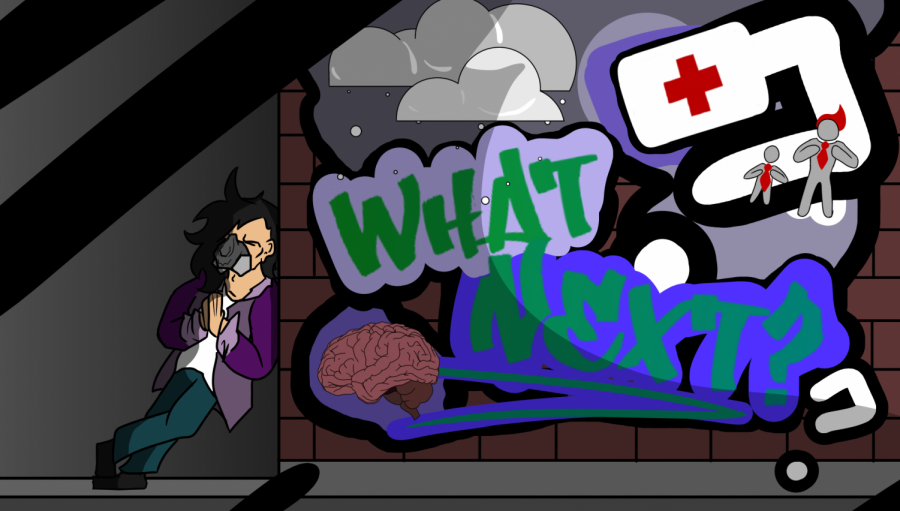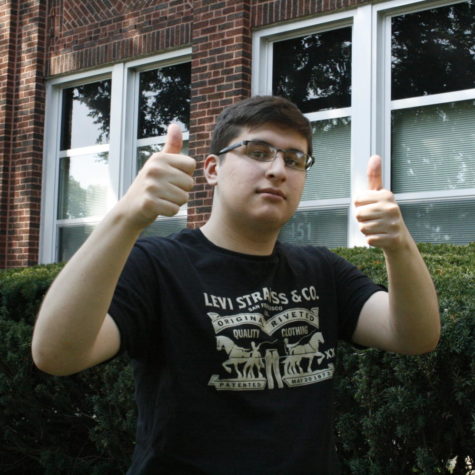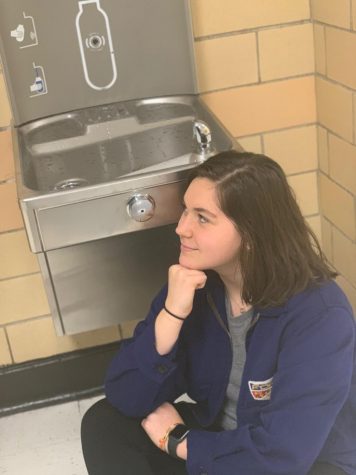Hope in the era of the Coronavirus
Art made to represent hoping for positive change after the coronavirus.
May 28, 2020
The coronavirus has transformed our lives in a matter of weeks, from peaceful daily routines to the harsh reality of coping and sacrificing in the epicenter of an international catastrophe. The Clarion staff are living very different lives right now, compared to the relative commonalities of our previous school schedule. Now, some of us are essential workers, some are passing the time with eLearning, some have caught and recovered from the coronavirus, and some are just having fun with new hobbies. But all of our lives are now divided into two parts: before the coronavirus and after. It is easy to fall into nostalgia about the “before.” However, the Clarion staff has decided to take some time to consider the “after” portion of our lives. As young adults, we are the ones inheriting the world after this tragedy so we started to view it also as an opportunity for growth and positive change. Hope is our weapon against this uncertainty and fear so we will continue to use this power to make the best out of this unprecedented and scary situation.
Social lives, communication, and mental health:
As students, the structure and lifestyle we previously had is now fractured, leaving us with the responsibility of piecing together our own schedules. We have more time alone and for many of us, we have more responsibility than we thought we could handle. Mental health is now being brought to the forefront of society as a result of seeing more clearly than ever what happens when people are left alone with their thoughts, but without a concrete support system and structure to help them in dark times.
Despite our community being distanced, we need each other now more than ever. We are coming together to help others, with physical things like money, groceries, and work, but also just with pure kindness. Socialization is now a conscious effort; we can’t just see our friends daily to know how they are doing. Checking up on people is now common and it has shown us how that care and respect can impact mental health. There are also now so many different ways professional counselling and mental health resources can be more accessible through calling and online platforms. Mass loneliness and disconnect are not new phenomena; however, now it cannot be ignored or avoided by adding more things to schedules. All of our problems are clearer than ever before so we need the support of our friends and family, as well as professional support sometimes too.
We have also had to work harder at making things better for ourselves as individuals. During school time, a lot of us didn’t get enough sleep, sometimes skipped meals, or had almost no free time because we devoted ourselves to good grades and extracurriculars. Life was fast paced and now it is in slow motion. This leaves us with a need to practice self-care and prioritize our mental health over other things like work or school. We hope personal growth and development is still considered essential and meaningful after this because it truly is just as important as all the other activities we make time for.
Social distancing has altered the way we communicate fundamentally. There’s not much to talk about anymore unless you want to fall down the rabbit hole of coronavirus news and fears. Now, we find ourselves skipping small talk and filler for more genuine, serious conversations. We have opened up a broader spectrum of discussion, forcing us to get to know the hearts of the people we are close to in a much deeper way than ever before. It feels harder to get lost in conversation because now we have to designate time to talk to others instead of just chatting because of circumstance.
The stigma surrounding getting emotional with others is slowly eroding, paving the way for more meaningful conversations. However, this is not to say that small talk is not just as valuable as these serious discussions. It breaks the ice sometimes and can lead to incredible friendships. What we are hoping for is a balance of the two forms of communication. There is a time for everything and when one or the other types of conversation is completely eliminated, it feels wrong.
Celebrity culture:
Social media is now showing us a different side to celebrities that was largely hidden from the public before. In this extra time, celebrities are being paid more attention to and we are seeing some problematic actions at times. This does not mean we want a sort of “cancel culture.” We just want to look at their actions critically and determine if we like the type of people who are being used as role models today. We hope we can avoid idolizing them just for their wealth, but rather to evaluate them as people like anyone else. We cannot expect them to be morally superior either. As the shock factor surrounding celebrities is being eliminated, we have to consider the expectations we set for role models and the role of power and fame in our society.
Struggles of our healthcare system:
This crisis has highlighted many issues but one particularly large problem we predict we will have to contend with in the future is the state of our healthcare system. It is easy for us as healthy teenagers and young adults to merely speculate what must be done to fix things, but it is imperative we don’t forget the real people being affected by this the most. This includes people who are on the frontlines, risking their lives as doctors, nurses, janitors, and workers who are overloaded with work in some of the most deadly areas of this crisis. Patients are also struggling for a multitude of reasons beyond just this life-threatening illness, such as paying for treatment, the dangers of sickness while incarcerated, and the fact that minorities are getting disproportionately sick because of this.
This health crisis is showing our true values as a nation like never before. American society is more individualistic than many other countries. What this means is that we have boundless ambition, a fierce spirit, and love for our work. However, it also means that we have often seen our own needs and wants as first priority, which we now have to rethink in this new context. We are caught in the struggle of balancing individual needs vs. community needs in order to protect our healthcare system. We have noticed our generation paying way more attention to new ideas like democratic socialism, communism, and more community-focused approaches to government. We are questioning the limits of the federal government’s involvement in our lives and what we are entitled to as free Americans, which includes our need for affordable healthcare. Some presidential campaigns have addressed this in the past and stirred up a lot of controversy but now we are examining these ideas with our own research to form opinions that make sense to us.
We think large scale reform could happen in the future, but ultimately what we are seeking is consideration and respect for the people being affected by this by not adding to their problems. There has been a lot of resistance to social distancing and claims that this shutdown is a denial of individual rights. Though all of us crave our normal lives more than anything, we feel that we cannot rush the long healing process we have ahead of us by reopening things too quickly. Sacrifices must be made for the greater good.
We must also contend with the reality of racism and discrimination that we are already seeing and will continue to see towards Asian Americans that is similar to the American public’s attitude towards Muslims in the post-9/11 era. One of our editors, Seymone Russell, has written a story we feel is very representative of this situation and the aforementioned topics of healthcare and the effects of this on the incarcerated.
The value of jobs:
The stereotypical value of types of jobs is being challenged by this crisis. Now, janitors and food service workers are being praised as much as we used to idolize lawyers and other high profile careers. We hope that this new reliance on the people working behind the scenes of this crisis helps people realize the importance of jobs like customer service. We want to change the stigma around essential workers that may have made people under-appreciate them or even look down on them. Even now, we are still seeing some of this and we hope that people will be more sympathetic and understanding of these workers considering the immense stress they face every day at work. We hope that this also is followed up with our economic choices, maybe by making better minimum wage requirements, giving people more time off, and other benefits for employees over time.
Fake news vs. science:
Debunking fake news is crucial in a time when these facts will define our future security as a country. We need to be on the same page for things to get better, despite different political views and ideologies. It is really sad that the information we see in our media isn’t always correct but that is our current reality, so we need to assess our news critically. We hope that people do their own research to determine the inconsistencies and realize that the statistics of the coronavirus on the screen translate to real people and real lives. There are so many different claims floating around so we need to zero in on the true research instead of twisting studies to fit opinions and narratives. We want people to be able to differentiate when arguments are evidence-based and when they are assumptions based on unreliable research. We hope this tumultuous climate surrounding journalism gives way to the rise of science and inspires more scientific literacy in Americans.
After the Coronavirus:
When we watch the news or even just the world around us, sometimes all we can see is the complete destruction that the coronavirus has brought upon our lives. This was part of nobody’s plans and we are still fighting this every day. The older generations, our parents and teachers and community members, are protecting us and the world by setting up social distancing guidelines and working important jobs. But it is us, the younger generations, who will have to create a new world in the wake of this. So what are we going to do? Hope becomes action when you are so passionate about fixing problems. We are going to prioritize mental health. We are going to change the definition of celebrities from just rich and untouchable to role models that we are proud of. We are going to fix a broken healthcare system that overruns our doctors and nurses and excludes people of color, the incarcerated, and average Americans that can’t afford it from quality healthcare. We are going to value all jobs and strive for more economic equality and benefits for workers. We are going to use journalism to our advantage and become more scientifically literate. We are going to change the world.



